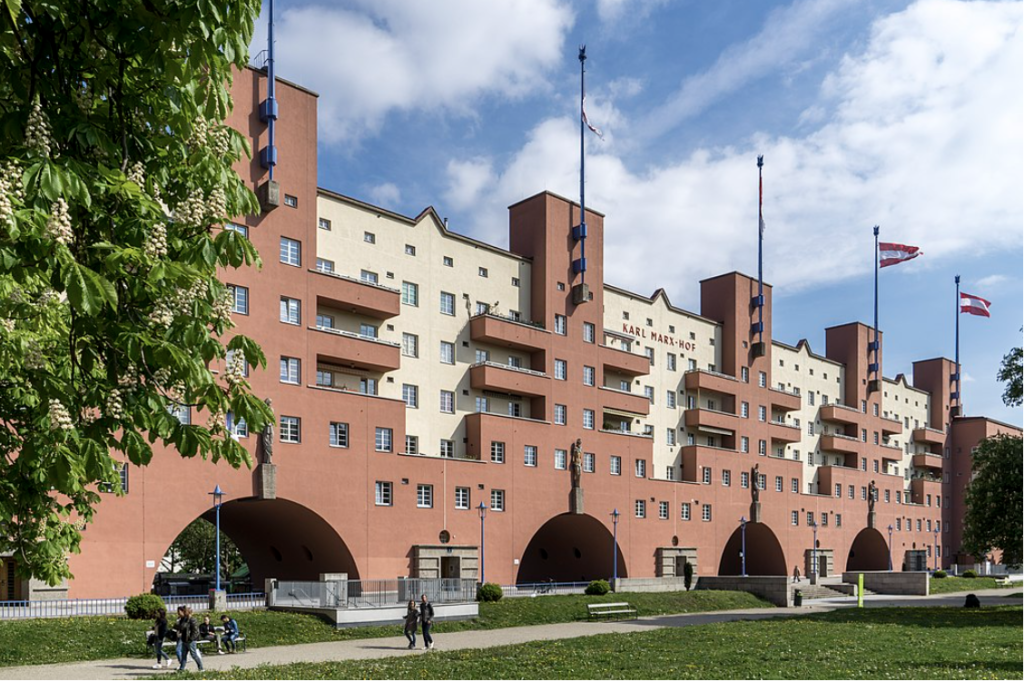Vienna is all the rage in California.
The UK Guardian reports that delegations from up and down the state have descended on that Austrian city to look at how it manages to house its population, when “a centrally located two-bedroom apartment can cost you as little as $600 a month.”

From the article:
In the past two years, at least four delegations of housing experts and political leaders from California have visited the Austrian capital, hoping to unlock the secrets of why Vienna regularly comes top in surveys of the world’s most livable cities.
They’re struck by the absence of homeless encampments, and marvel at the sheer scale of the subsidised housing developments which include shared amenities such swimming pools, gyms, workshops, communal gardens and spacious roof terraces.
And they wonder how they can bring some of it home to a region gripped by an unaffordability crisis that lands long-term residents out of state or on the streets.
More:
The city of Vienna builds about 6,000-7,000 new units of subsidised housing every year as it tries to keep up with rising demand. “They’re just building more housing than us. It’s not rocket science,” said Corey Smith of San Francisco’s Housing Action Coalition.
No, it’s not rocket science. If the federal, state, and local government subsidized 7,000 units of non-market social housing every year in San Francisco—and that would be a great way to revitalize downtown—we would not have the current crisis.
Same goes for dozens of other US cities.
Why doesn’t that happen?
It’s not rocket science.
In Austria, people who earn more than $1 million a year pay 55 percent of their marginal income in taxes. In the US, it’s 38 percent. In Austria, there’s a 1 percent additional income tax that just goes for housing. In the US? Nothing.
Austria spends less than 1 percent of its Gross Domestic Product on the military. The US spends almost 3 percent.
If the US taxed the very rich at the same level as Austria, my rough calculations, based on IRS data, suggests that the country would collect another $180 billion in taxes. That would build a lot of affordable housing.
It this country collected the same level of taxes from the rich that we did in 1975, the lower 90 percent would have an additional $50 trillion. That’s the end of the housing crisis, the end of homelessness, the end of student debt … that’s a national health care system.
I asked Smith about all of this, and he told me:
I’m trying to pitch the same income tax they use to the Gubernatorial candidates. I think the only way that passes at the ballot is with broad support. As you may know, HAC is a testifying witness in support of Assemblymember Alex Lee’s social housing bill this year.
Fair enough. He also pointed out that Vienna allows more private housing than SF. But if a city builds abundant, high-quality social housing, it keeps private housing prices down, too, way better than private housing alone can ever do.
Maybe he and the other Yimbys can ask all of the candidates for mayor: Do you support a surtax on the very rich in California to fund social housing? How will you promote that as mayor? Do you support a city income tax?
How much money will the billionaires who support the Yimby movement give for a ballot measure to tax the rich to pay for housing?
There’s a reason Vienna has social housing. Between 1918 and 1934, the Social Democratic Workers Party controlled the city, and for a while, the nation, and they used taxes on the rich to fund housing. It was called “Red Vienna.”
The progressives, the democratic socialists, made housing affordable. The local folks who take that approach are the ones the tech industry, with the support of a lot of the Yimbys, is determined to force out of office, the ones Gary Tan thinks should “die slow.”
Ironic.







